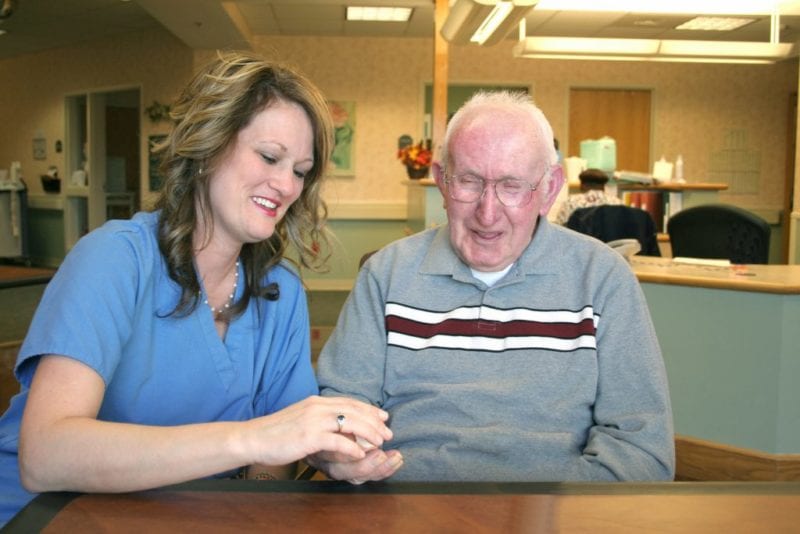How to get the most out of a short-term respite stay in aged care
Complacency is not our thing at The Physio Co (TPC). We like to always search for new ways to keep our senior clients as mobile, safe and happy for as they can be for as long as possible.
We once spent five months working with a client, John, to help him regain his strength, balance and fitness so he could get back to living life the way he wanted to.
John, who lived at home on his own, became a TPC client after he’d fallen, broken a bone in his shoulder and spent some time in hospital recovering. It was during that hospital stay that his doctor recommended the time might be right to permanently move into a residential aged care facility to avoid more falls.
However, leaving his home and moving into residential aged care was the last thing John wanted to do.
Would you prefer to listen to this article?
Respite care stay
John, his GP and his family considered his health and his care options, they finally agreed on a compromise – a respite care stay in a residential aged care facility before going home completely.
So, after leaving the hospital, John had a short, three-week respite stay in a residential aged care home to recover from his fall.
It was during John’s respite stay where one of the TPC team and John first met. The TPC Physio learned about his fall, his injured shoulder and his plan to move home. They quickly realised we had work to do together, so we got to it!
In that first conversation between John and his new TPC Physio, John told us, with a smile on his face, about his goal to return home and get back into his routine of walking to his local Men’s Shed where he likes to build wooden toys for local kids.
With this goal in mind, John and his physio decided that this would need John to be fit enough to walk at least 500m each way, plus have his arm working well enough to do his woodwork. So, together, they made a plan to rehabilitate his shoulder and improve his fitness.

Great improvements
John and his physio worked together three times per week during his respite stay. John worked hard, did his exercises and over the three weeks made some great improvements. John then moved home and continued to work with his physio two times per week in his own home – we went to him so he could do physio at home.
John’s exercises had started out very gentle. Over time, as his strength, fitness and confidence grew, he progressed to much more active exercises that he hadn’t been able to do for years. That’s when we started walking from his front gate, towards his Men’s Shed. We didn’t get far the first few weeks, but, we were making progress.
It was a long haul for John, but, five months after we first started working together, John made it back to the Men’s Shed, was making toys and spending time with his mates.
John’s TPC physio still visits John once per week in his own home. Yes, he has achieved his goal, but, for the time being, he’s still improving his balance, strength and shoulder movement to hopefully prevent more falls and hospital stays. Prevention is just as important as a cure.
What is a respite stay?
A respite stay is a short, restorative, stay in a residential aged care home. It is a break. A reprieve from the norm. A breather.
A respite stay can be a good option for an older person who is having trouble keeping up life at home – often on their own. Whether you’ve had a fall like John, or if life at home of cooking, cleaning, shopping, showering and all the other things that need doing, is getting harder to manage, then a short respite stay in residential aged care – where all those things are done for you – can be a good option.
Respite stays in aged care can be as short as a week or as long as a month at a time.
How do I book a respite stay in aged care?
Start by talking to your GP or the Government’s My Aged Care team.
To access Government-subsidised aged care services in Australia, including home care, residential care and respite care, you’ll need an assessment from your local Aged Care Assessment Team (ACAT). This team of health workers can then help to understand your needs and help explain your options.
Stay active, stay strong
There are many great things about respite, but there is at least one potential risk. That is, respite care can be such a great help – having people cook, clean wash and care for you for weeks at a time – that you can become dependent upon full-time care and unable to cope with moving home again permanently after respite.
This risk can be even greater when you’re having a respite stay to help recover from an injury, a fall, an illness or an operation.
Staying active and preparing for your return home (if that’s the plan) is a super-important part of any respite stay. Making the most of the extra time you’ll have during a respite stay because you won’t have to do all those cooking and cleaning jobs, allows more time to relax, chat, rest and do some exercise!
The team here at The Physio Co can help you have a great, active respite stay AND make sure you are mobile, safe and happy enough to move home again when the time comes.
Interested in knowing more?
Please call on 1300 797 793 or email [email protected] 🙂

 1300 797 793
1300 797 793
